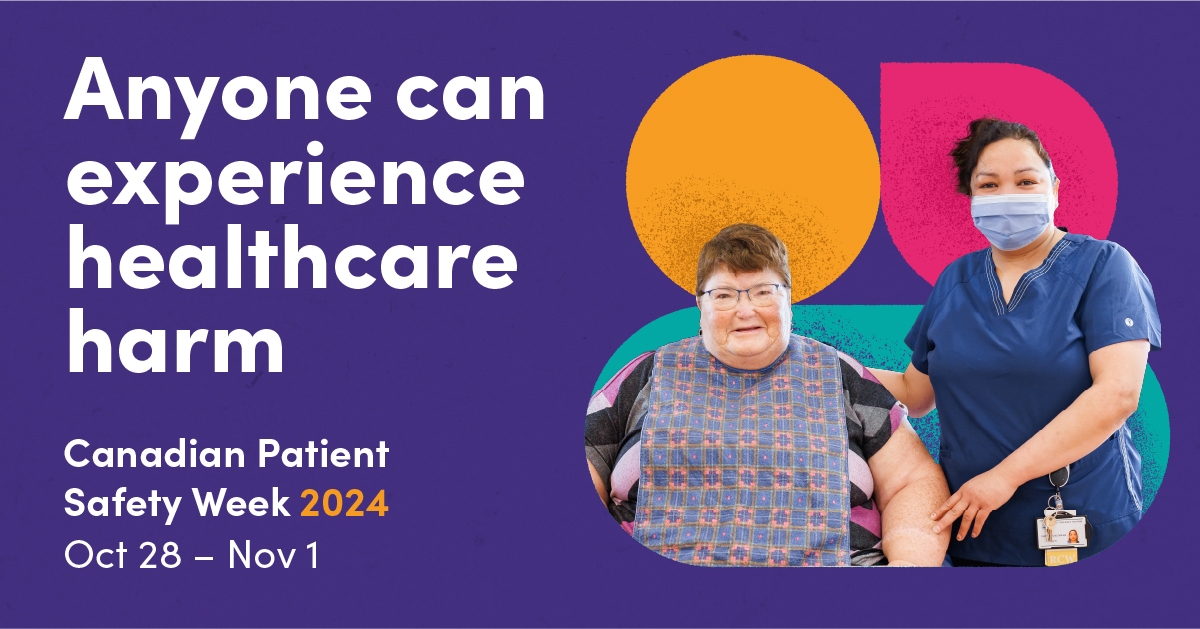The Importance of Having Safety Conversations With Your Healthcare Provider

When people receive healthcare, they want effective care that they can trust to keep them safe and meet their needs. Sometimes, despite best intentions, because the healthcare system depends on human expertise, interaction and knowledge, errors and situations can occur that lead to unintentional harm. Research shows that one in three Canadians have experienced a patient safety incident when receiving care, such as a misdiagnosis or medication error. These incidents can range in severity from minor inconveniences to serious and life-altering consequences.
Clients, or patients and their loved ones, have a valuable role to play in helping to prevent harm by identifying hidden risks, hazards and safety concerns. Evidence continues to demonstrate that when healthcare providers work closely with patients, families and carers, it leads to improved safety, better health outcomes and decision-making. While it may seem that healthcare providers shouldn’t need this assistance, we all play a role in keeping ourselves and our loved ones safe.
One of the most effective ways to prevent harm, whether you are delivering or receiving care, is by having safety conversations. Read on to learn more about safety conversations, why they’re important, how to prepare and why we all need to work together to improve patient safety.
What Are Safety Conversations?
Safety conversations are an important part of creating a safe culture for patients and providers and to respond to or manage harm after it occurs. ‘Patients’ include home care clients, hospital and clinical patients, long-term care residents and community care clients. Safety conversations involve discussions between a care provider or clinician such as a physician, nurse, pharmacist, occupational therapist and personal support worker and a patient and their loved ones.
Patients, families and caregivers have a lot of knowledge and are experts in their own experiences and care. If you are a patient or providing support for a loved one, and you see, hear or feel something that is concerning you, you need to speak up! You may not know what is wrong, but you know something just isn’t right. Ask all the questions you have, take note of the answers and keep communication open.
Why Are These Conversations Important?
Speaking up and asking questions will help prevent safety incidents from occurring and allow providers and organizations to respond to and learn from incidents to improve care safety. These conversations create a partnership between patients and their healthcare team, help build a positive safety culture, reduce health inequities and lead to less harm. These conversations are a powerful way for everyone—whether you are receiving, delivering or observing care—to work together to improve patient safety.
What Are Some Examples of Preventable Healthcare Harm?
Avoidable or preventable harm includes an event or hazardous condition that is a result of care rather than a person’s underlying illness. Some examples include:
- Medication errors
- Diagnosis delays or mistakes
- Healthcare-related infections
- Patient falls during care visits
- Patient misidentification
- Culturally unsafe care
- Pressure ulcers/bedsores due to delayed care
How Do I Have Safety Conversations With My Care Providers?
Safety conversations can be particularly challenging if you’ve experienced healthcare harm or discrimination in the past or have been reprimanded or dismissed after asking your healthcare provider questions. It’s important to remember that you are a valuable member of your health team. You provide an extra set of eyes and ears, can identify when something feels off and are completely invested in your well-being and health outcomes. To help you stay safe, informed and flag a concern, ask, listen and act:
Ask
-
- Write down all of your questions before you meet with your care provider and as they come up.
- If you receive a new diagnosis or treatment plan, ask why you need a specific procedure, what it will involve or if there are any other options.
- If you’re prescribed a new medication, ask what it does, the possible side-effects and how and when you should take your medication. Double-check at the pharmacy that the prescribed medication is for your condition.
- If you are concerned about something specific, you can say, “I’m worried about my loved one’s symptoms,” or, “I’m uncomfortable with this treatment plan.”
Listen
-
- Write down important details during conversations with your healthcare provider to help you anticipate what’s coming and to make informed decisions.
- Bring a family member or friend with you to appointments so they can remember details and flag concerns.
- If there’s something you don’t fully understand, ask again.
Act
-
- If you have specific safety concerns, work with your provider to identify and find solutions.
- Ask for the plan and the steps involved so you know what to expect and when.
- Make sure you follow up to ensure that your concerns are addressed and preventative steps have been taken.
If you have concerns about the safety of your care, always start by talking directly to your healthcare provider or the appropriate supervisor or manager. Healthcare organizations and regional authorities often have patient relations departments to address these types of concerns. If your situation is not resolved, consider contacting the related college, professional association or the Ministry of Health.
It’s Canadian Patient Safety Week 2024(opens in a new tab) and we’re broadening our understanding of healthcare harm, together! At VHA Home HealthCare we know that people can experience harm while delivering and/or receiving healthcare and we’re committed to being a champion for safer care. You can too by visiting UnderstandHarm.ca
